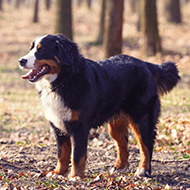
Vets encouraged to contact Anderson Moores to discuss suspected cases.
A further nine cases of the potentially fatal cutaneous and renal glomerular vasculopathy (CRGV), also known as Alabama rot, have been identified by Anderson Moores Veterinary Specialists.
The new cases have been identified in Maidenhead and Reading, Berkshire; Nuthall, Nottinghamshire; two cases from Goring, Oxfordshire; Basingstoke and Alresford, Hampshire; and Beddau, Rhondda Cynon Taff, Wales.
It brings the total number of confirmed cases in the UK since 1 January to 12 - 25 per cent of the total number of cases confirmed in 2020.
Team leader David Walker, a European specialist in small animal internal medicine and the UK’s foremost authority on the disease, said: “We’re very sad to confirm 12 new cases of CRGV already in 2021. We are also awaiting results of a further seven possible cases. Unfortunately, we find ourselves at the time of year when cases are most commonly identified.
“It is understandably a worrying time of year for dog owners with regard to CRGV; however, the disease remains rare. The disease seems to appear across many counties at this time of year. January and February are typically our highest case number months and this year is sadly no different.”
CRGV is a serious, often fatal, disease of the kidneys. It was first detected in the UK in 2012 and has since been identified in multiple locations across the country, including Gloucestershire, Surrey, Derbyshire, Yorkshire, Lancashire, Cornwall, Devon, and Staffordshire.
While the cause of CRGV remains unknown, Anderson Moores Veterinary Specialists remains heavily involved in the ongoing research.
Mr Walker added: “Treatment primarily revolves around intensive management of the acute kidney injury and is sadly only successful in around 10 per cent of cases. Vets should feel free to contact the team at Anderson Moores to discuss any suspected cases of CRGV.”



 The Veterinary Medicines Directorate (VMD) is inviting applications from veterinary students to attend a one-week extramural studies (EMS) placement in July 2026.
The Veterinary Medicines Directorate (VMD) is inviting applications from veterinary students to attend a one-week extramural studies (EMS) placement in July 2026.